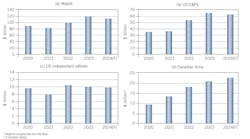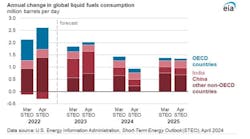Oil futures have continued to rise due to traders’ concerns over the war of words launched by Venezuelan President Hugo Chavez after ExxonMobil Corp. last week won a court injunction freezing as much as $12 billion in assets owned by state firm Petroleos de Venezuela SA (PDVSA).
“If you end up freezing (Venezuelan assets) and it harms us, we’re going to harm you,” Chavez threatened, adding, “We aren’t going to send oil to the United States.” The Venezuelan leader also warned that US “aggression” could cause world oil prices to spike to $200/bbl.
While some traders dismissed Chavez words as inconsequential, others were said to be worried about the potential cutoff of Venezuelan oil. Light, sweet crude for March delivery jumped $1.64 to $93.41/bbl on the New York Mercantile Exchange after spiking to $94.72/bbl earlier, a 1-month high.
Chavez’s comments followed what one commentator called “a blitz on state television” of programs and advertisements denouncing ExxonMobil as a predator seeking to plunder Venezuela.
The blitz came after the US firm launched a series of lawsuits in US, British, and Dutch courts, all aimed at challenging Chavez’s nationalization of a multibillion-dollar oil project formerly owned by ExxonMobil in Venezuela’s Orinoco belt.
Last week’s court rulings in the US and UK mean that PDVSA, Venezuela’s main source of income, cannot sell certain assets or move some funds while the compensation case is reviewed.
Rafael Ramirez, PDVSA president and Venezuela’s oil minister, told a press conference at PDVSA headquarters in Caracas that appeals would be filed next week in British and US courts seeking to reverse the order.
Meanwhile, Ramirez launched into a tirade of his own against ExxonMobil, saying, “They are the typical North American transnational company. They want to take [Venezuela] hostage.”
However, Bernie Picchi, an analyst with Wall Street Access, said in a note to clients: “Exxon is finally standing up to a regional bully, and has shown that it can inflict a punch at least as severe to Venezuela than the one Venezuela inflicted on [ExxonMobil].”
While ExxonMobil refused to participate any further in the Orinoco project, PDVSA recently agreed to pay qualified compensation to two of its partners, Total SA and Statoil AS, for their reduced stakes in the nationalized developments (OGJ Online, Feb. 1, 2008).

